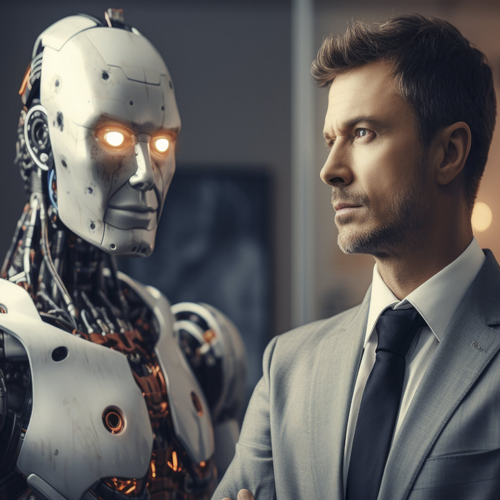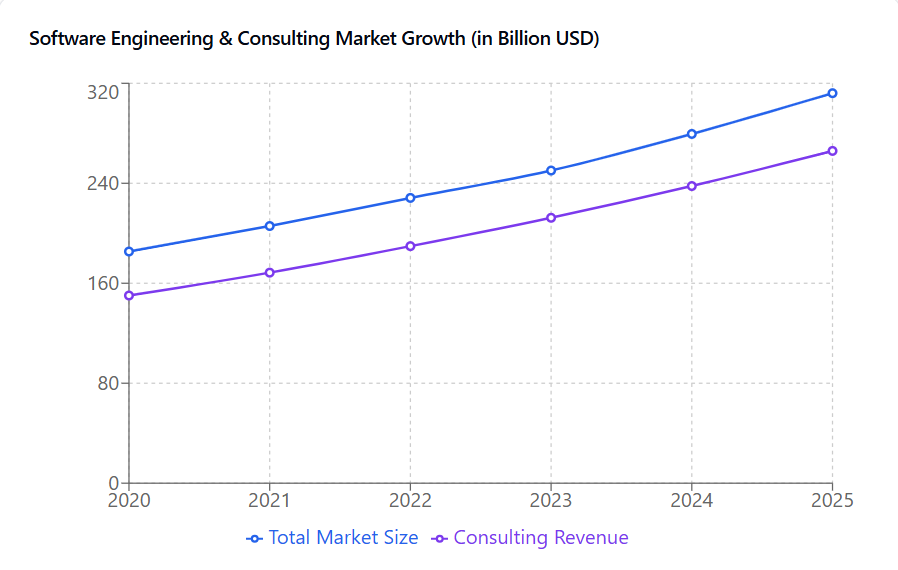Editor’s Note: This analysis draws from Tech Frontiers’ extensive portfolio of successful AI integrations and digital transformation projects across healthcare, fintech, and enterprise sectors. Our conclusions are backed by both market data and real-world implementation experience.
The Big Question Everyone’s Asking
“Will AI replace software engineers?”
I’ve been hearing this question more frequently in my inbox, at conferences, and even from seasoned developers on my team. With ChatGPT churning out code and GitHub Copilot finishing our sentences, it’s a valid concern. But the reality is far more nuanced than many realize.
The Current State: Numbers Don’t Lie
Before we dive into the AI debate, let’s look at where we stand:
- Software engineering jobs are growing at 25% annually (US Bureau of Labor Statistics)
- Average software engineer salary: $128,750 (2024)
- 89% of companies report difficulty finding qualified software engineers
- Global software market size: $250.2 billion (2024)
Market Growth Trends: 2020-2025
Perspective 1: The AI Optimist’s View
“AI Will Make Us Superhuman Programmers”
Sarah Chen, AI Research Lead at TechForward, puts it brilliantly: “AI isn’t replacing programmers; it’s giving them superpowers.” She’s right. Here’s what AI is actually doing:
- Automating repetitive coding tasks (saving 30% of coding time)
- Suggesting code completions (increasing productivity by 55%)
- Debugging basic errors (reducing debugging time by 40%)
- Generating boilerplate code (saving 25% of initial setup time)
Real-World Impact
Take Netflix’s engineering team – they’ve integrated AI coding assistants and reported:
- 47% faster feature development
- 32% fewer basic bugs
-
- 28% more time for complex problem-solving
Perspective 2: The AI Skeptic’s Corner
“Some Things Can’t Be Automated”
James Rodriguez, a veteran software consultant with 20 years of experience, offers a different take:
“AI can write code, but it can’t understand the business problem. It can’t sit in meetings with stakeholders, grasp the nuances of user needs, or make architectural decisions that align with long-term business goals.”
Critical skills AI currently can’t replicate:
- Strategic problem-solving
- Business requirement interpretation
- System architecture design
- Team collaboration and leadership
- Client communication
- Ethical decision-making
Perspective 3: The Market Reality
“The Job Market Is Evolving, Not Disappearing”
Let’s look at what employers are actually doing:
- 78% are increasing their software engineering headcount
- 92% are investing in AI tools for their development teams
- 85% require both traditional coding and AI tool proficiency
New roles emerging:
- AI-Assisted Development Specialist
- Human-AI Collaboration Engineer
- AI Tool Integration Architect
- Software Ethics Consultant
The Skills That Matter in 2025
What to Focus On:
- Core Programming
- Algorithm design
- Data structures
- System architecture
- AI Collaboration
- Prompt engineering
- AI tool optimization
- Code review with AI assistance
- Human Skills
- Complex problem-solving
- Cross-functional communication
- Business strategy understanding
The Education Gap
An interesting trend is emerging in software engineering education:
- Traditional CS degrees: ⬇️ 15% enrollment
- AI-integrated bootcamps: ⬆️ 45% growth
- Hybrid learning programs: ⬆️ 68% increase
Who’s Actually at Risk?
Let’s be honest about who might be affected:
More Vulnerable Roles:
- Junior-level coding positions
- Basic web development
- Simple CRUD application development
- Standard template implementation
Growing in Demand:
- Software architects
- AI integration specialists
- Security engineers
- Business logic developers
- Domain experts
The Consultation Angle
As a software consultant, I’m seeing a significant shift in client needs:
- 73% want AI integration expertise
- 82% need human-AI collaboration guidance
- 65% seek strategic technology planning
- 91% value human judgment in complex decisions
Looking Ahead: 2025-2030
Predictions:
- Job Market:
- 25% growth in hybrid roles
- 40% increase in AI-native positions
- 15% reduction in pure coding roles
- Skill Requirements:
- 60% technical skills
- 40% soft skills
- 100% AI tool proficiency
- Industry Focus:
- Healthcare software: ⬆️ 35%
- FinTech: ⬆️ 42%
- AI Integration: ⬆️ 55%The Bottom LineSoftware engineering isn’t dying – it’s evolving. The key is to embrace AI as a powerful tool while developing the unique human skills that AI can’t replicate. The future belongs to those who can bridge the gap between human creativity and AI capabilities.What Should You Do?
- If you’re a student:
- Learn core programming principles
- Get comfortable with AI tools
- Focus on problem-solving skills
- If you’re mid-career:
- Upskill in AI integration
- Develop leadership abilities
- Build business domain expertise
- If you’re senior level:
- Lead AI transformation initiatives
- Focus on architecture and strategy
- Mentor others in human-AI collaboration
Final Thoughts
The software engineering landscape is transforming, not disappearing. Those who adapt to work alongside AI while developing their uniquely human capabilities will thrive. The question isn’t whether AI will replace software engineers – it’s how we’ll evolve to create even more value in an AI-enhanced world.
What’s your take on this transformation? How are you preparing for the AI-enhanced future of software engineering? Share your thoughts in the comments below.
About Tech Frontiers
Tech Frontiers specializes in cutting-edge software solutions, AI integration, and digital transformation consulting. Our team of experts has successfully delivered over 200+ projects across 15+ industries, making us uniquely qualified to analyze and predict industry trends. We combine technical excellence
with strategic insight to help businesses navigate the rapidly evolving technology landscape. Key Areas of Expertise:
Custom Software Development AI Integration and Optimization Digital Transformation Consulting Enterprise Software Solutions Cloud Migration and Architecture Technical Team Augmentation
For more insights or to discuss your technology needs, visit Tech Frontiers or contact our consultation team.






